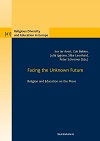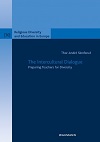| Buchhandlung Heesen | Versandbuchhandlung für Evangelische Theologie |
Impressum | |
| Freudenstadt / Loßburg | Datenschutzhinweise | ||
| Tel. 07446 952 418 1 | Buchhandlung.Heesen@t-online.de | ||
| Da unsere Angebote manuell erstellt werden und während des Seitenaufrufes keine Verbindung zu einer Buchdatenbank aufgebaut wird prüfen wir die Verkaufspreise bei Rechnungsstellung auf Richtigkeit und berechnen den gesetzlich festgelegten Buchpreis. Falls sich dadurch eine Preiserhöhung ergibt werden wir Sie vor Versand informieren, Sie können dann diesem Preis zustimmen oder vom Kauf zurücktreten. Hinweise zum Datenschutz und Cookies | |||
| Religious Diversity and Education in Europe | ||
 |
Ina ter Avest Facing the Unknown Future Religion and Education on the Move Waxmann Verlag, 2020, 280 Seiten, 978-3-8309-4076-0 39,90 EUR |
Religious Diversity and Education in Europe
Vol 41 All contributions to the volume were developed in the context of the European Network for Religious Education through Contextual Approaches (ENRECA). In the 20 year history of the research community of ENRECA several times books are published on contextual factors of Religious Education. This volume has a special focus on different perspectives of ‘time’ in relation to the tradition, present and future perspectives of Religious Education in Europe.During the 20 year history of the European Network for Religious Education through Contextual Approaches (ENRECA), several books have been published on the Subject of Religious Education, from sociological, psychological or anthropological perspectives and always in the contextual Settings of national educational frameworks and other specific culturally bound phenomena. Also, very often, an international comparative perspective was included. The shared goal was not so much to reflect on religion as such, and on its changing doctrines, institutions and prescriptions, but to try and understand religion in the specific European contexts of secularization and the plurality of life orientations, and to understand how religion becomes manifest in education in a variety of concrete policies and classroom practices, reflecting various social issues. This volume, marking the 20th anniversary of ENRECA, has a specific focus on the contextual dimension of time. Contents |
 |
Thor-André Skrefsrud The Intercultural Dialogue Preparing Teachers for Diversity Waxmann Verlag, 2016, 152 Seiten, Softcover, 978-3-8309-3413-4 24,90 EUR |
Religious Diversity and Education in Europe
Vol 30 The speed, scale and spread of international migration and globalisation have firmly placed the issue of intercultural dialogue at the top of the educational agenda in Europe and elsewhere. In this book, Skrefsrud sheds light on intercultural dialogue as a key competence for teachers working in changing and diverse classrooms. In the first part, the notion of dialogue is explored with the theory of culture, religion and communication as the focus. In the second part, Skrefsrud analyses the government-initiated curriculum framework for teacher education in Norway and discusses the preconditions for intercultural dialogue in educational policies. The analysis illustrates how difficult it is to make issues of difference permeate all aspects of teacher preparation. Contents |